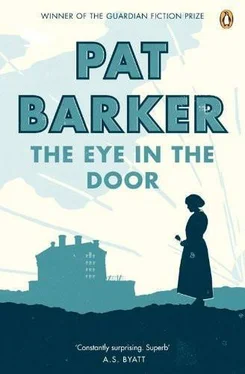His father had got his jacket and cap on now, and stood ready to go out, looking at them with a hard, dry, stretched-elastic smile, the two of them together, as they had always been, waiting for him to go. ‘I’ll see you, then,’ he said.
There was no question, as in the majority of households there would have been, of father and son going for a drink together.
‘When will you be back?’ his mother asked, as she had always done.
‘Elevenish. Don’t wait up.’
She always waited up. Oh, she would have said there was the fire to damp down, tomorrow’s bait to be got ready, the table to be laid, the kettle to be filled, but all these tasks could have been done earlier. Prior, once more lowering his eyes to the cup, tried not to ask himself how many violent scenes might have been avoided if his mother had simply taken his father at his word and gone to bed. Hundreds? Or none? The man who spoke so softly and considerately now might well have dragged her out of bed to wait on him, when he staggered in from the pub with ten or eleven pints on board.
Leave it, he told himself. Leave it .
After his father had gone, Prior and his mother went on sitting at the table while they finished drinking their tea. She never mentioned France or Craiglockhart. She seemed to want to ignore everything that had happened to him since he left home. This was both an irritation and a relief. He asked after boys he’d known at school. This one was dead, that one wounded, Eddie Wilson had deserted. He remembered Eddie, didn’t he? There were deserters in the paper every week, she said. The policeman who found Eddie Wilson hiding in his mother’s coal-hole had been awarded a prize of five shillings.
‘There was a letter in the paper the other week,’ she said. ‘From Father Mackenzie. You remember him, don’t you?’
She found last week’s paper and handed it to him. He read the letter, first silently and then aloud, in a wickedly accurate imitation of Father Mackenzie’s liturgical flutings. ‘“There may be some among you, who, by reason of your wilful and culpable neglect of the Laws of Physical development, are not fit to serve your country, but —” Oh, for Christ’s sake!’ He thew the paper down. ‘Some among them carry their wilful and culpable neglect to the point of getting rickets. If he’s physically well developed it’s because his mother could afford to shove good food in his gob four times a day.’ And goodness wasn’t he well developed, Prior thought, remembering Father Mackenzie in his socks.
‘He just thinks a lot of people are shirking, Billy. You’ve got to admit he’s got a point.’
‘Do you know the height requirement for the Bantam regiments? Five feet . And do you know how many men from round here fail that ?’
‘Billy, sometimes you sound exactly like your father.’
He picked up the paper and pretended to read.
‘There’s a lot of talk about a strike at the munition works. Your father’s all for it. Well, he would be, wouldn’t he?’
‘What’s it about?’
‘I don’t know.’ She groped for an unfamiliar word. ‘Dilution?’
‘Sounds right.’
‘Well, you can imagine your dad. “Bits of lasses earning more than I do.” “You mark my words,” he says, “after the war they’ll bring in unskilled labour. The missus’ll be going to work, and the man’ll be sat at home minding the bairn. It’s the end of craftsmanship. This war’s the Trojan horse, only they’re all too so-and-soing daft to see it.”’
Typical, Prior thought. However determined his father might be to raise the status of the working class as a whole, he was still more determined to maintain distinctions within it.
‘Oh, and he doesn’t like false teeth. That’s another thing,’ his mother went on. ‘Mrs Thorpe’s got them, you know. “Mutton dressed up as lamb,” he says. The way he goes on about her teeth you’d think she’d bit him. And then there’s Mrs Riley’s dustbin. Lobster tins, would you believe. “They were glad of a bit of bread and scrape before the war.”’
‘He’s got a funny idea of socialism.’
She shrugged. ‘I wouldn’t know. Things like women’s rights, he was never in favour of that.’
‘No.’
‘I remember him going on at Beattie Roper about that.’
A pause. ‘I went to see Beattie.’
She looked stunned. ‘In prison?’
‘Yes.’
‘You’ve no call to go getting yourself mixed up in that.’
Faced with this sudden blaze of anger, he said, ‘I have to. It’s my job.’
‘Oh.’ She nodded, only half believing him.
‘How’s Hettie?’
His mother froze. ‘I wouldn’t know. I never see her.’
There had been a time, when he was seventeen, when he and Hettie Roper had been ‘walking out’, and, for once, the ‘quaint expression’ had been painfully accurate. ‘Walking’ was exactly what they did. And talking too, of course: passionate, heated talk, about socialism and women’s rights, spiritualism, Edward Carpenter’s ideas on male comradeship, whether there could be such a thing as free love. He remembered one day on the beach at Formby, sitting in the dunes as the sky darkened, and the sun hung low over the sea. All day he had been wanting to touch her, and had not dared do it. The sun lingered, tense and swollen, then spilled itself on to the water. ‘Come on,’ he said, picking up his jacket. ‘We’d better be getting back.’
That night, as on so many other nights, his mother had been waiting up for him. A book was open on her knee, but she hadn’t bothered to light the gas. And then the questions started. He realized then that she hated Hettie Roper. He didn’t know why.
‘Does she still run the shop?’ he asked.
‘No point. Nobody’d buy anything off her if she did.’
‘Does she work?’
‘Not that I know of.’
‘So how does she live?’
A shrug. ‘She’s still got the allotment.’
‘I thought I’d pop round and see her.’
Silence.
Reminding himself he was no longer seventeen, Prior stood up and put his cup on the draining-board. ‘I won’t be long.’
Before the war, women used to sit on their steps in the warm evenings until after dark, postponing the moment when the raging bedbug must be faced, and taking pleasure in the only social contact they could enjoy without fear of condemnation. A woman seen chatting to her neighbours during the day quickly felt the weight of public disapproval. ‘Eeh, look at that Mrs Thorpe. Eleven kids. You’d think she could find herself summat to do, wouldn’t you?’ Now, looking up and down the street, Prior saw deserted doorsteps. Women were out and about, but walking purposefully, as if they had somewhere to go.
He supposed it was Mrs Thorpe’s name that came particularly to mind because she’d been one of the worst offenders, with her lard-white breasts the size of footballs, and Georgie or Alfie or Bobby worrying away at them, breaking off now and then for a drag on a tab end. Or perhaps, subconsciously, he’d already identified her, for there she was, coming towards him, divested of the clogs and shawl he’d always seen her in and wearing not merely a coat and hat but flesh-coloured stockings and shoes . It was scarcely possible the attractive woman with her should be Mrs Riley, but he didn’t know who else it could be.
They greeted him with cries of delight, hugging, kissing, standing back, flashing their incredible smiles. There was a saying round here: for every child born a tooth lost, and certainly, before the war, Mrs Thorpe and Mrs Riley had advertised their fecundity every time they opened their mouths. Now, in place of gaps and blackened stumps was this even, flashing whiteness. ‘What white teeth you have, Grandma,’ he said.
Читать дальше












